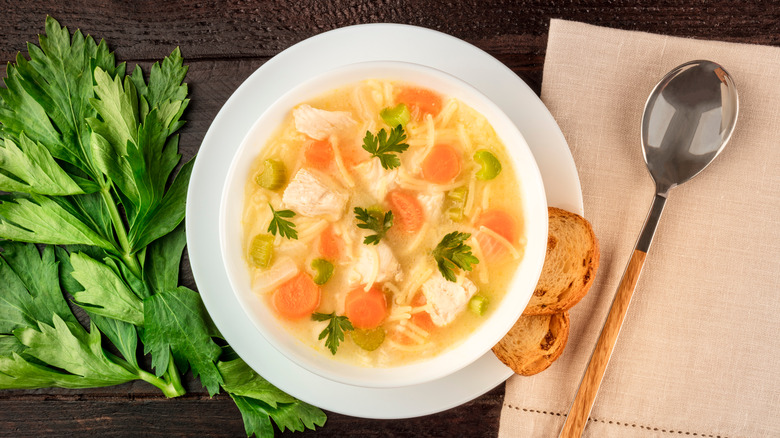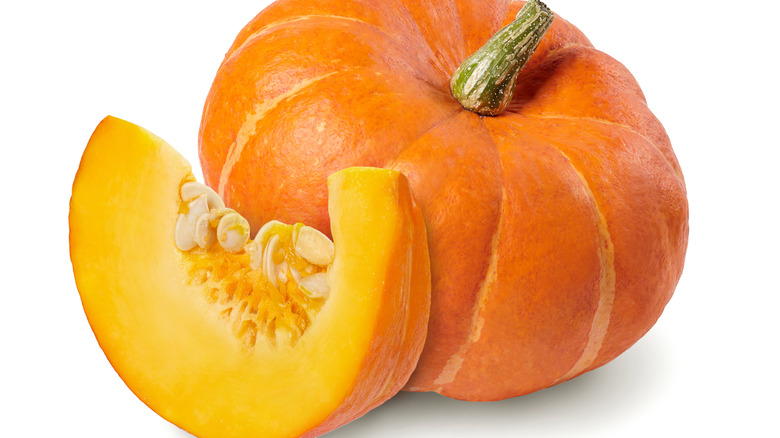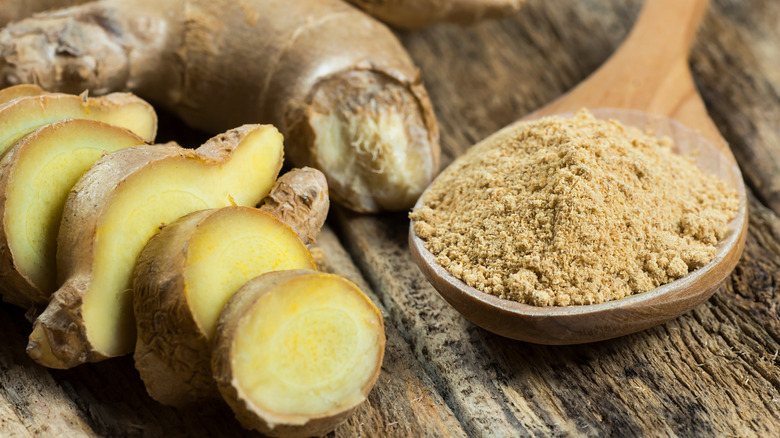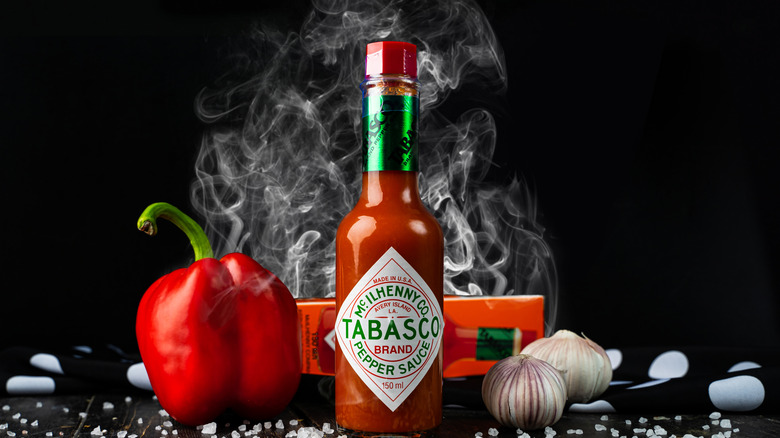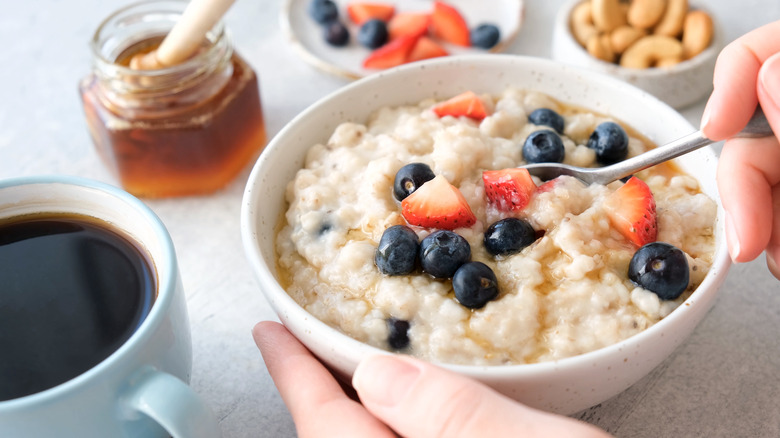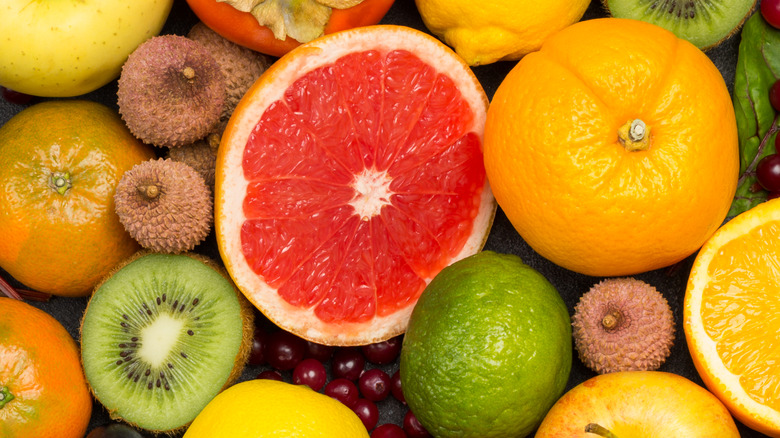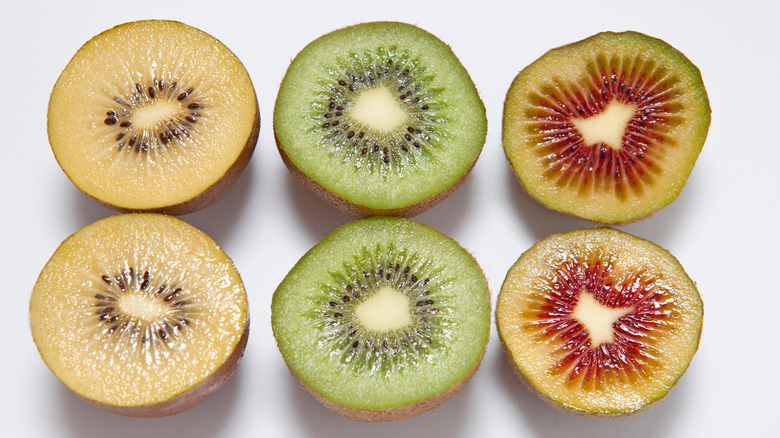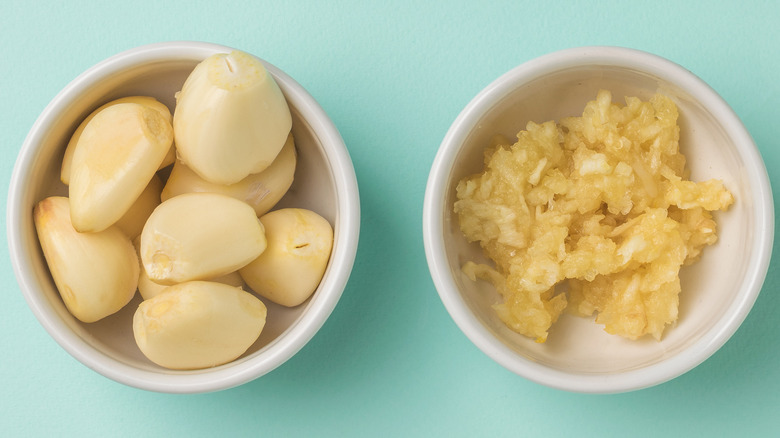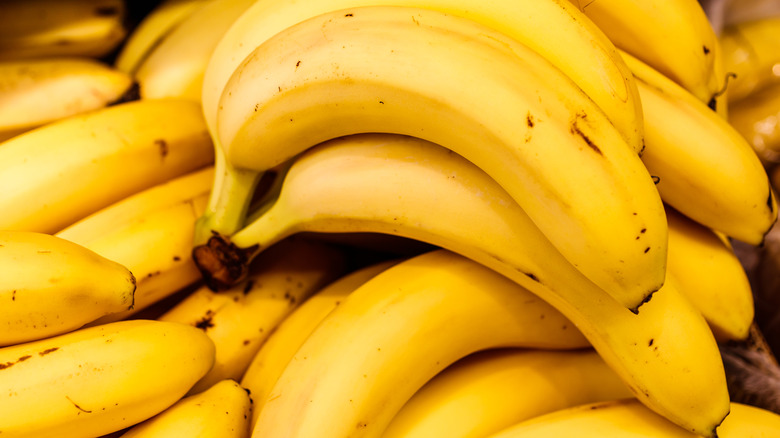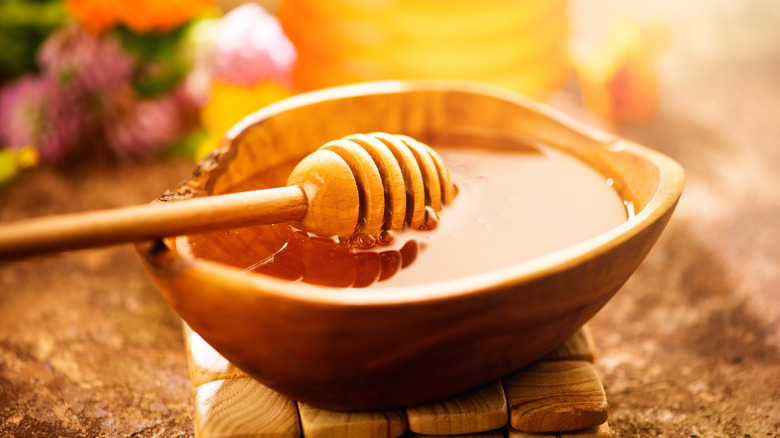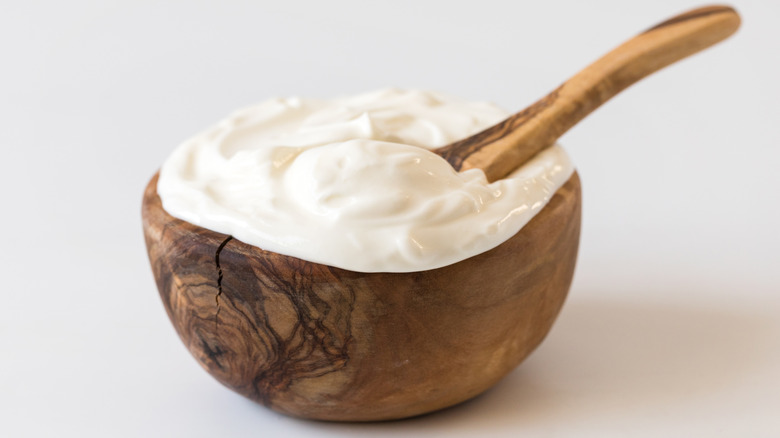Foods You Should Eat When You're Feeling Sick
When you get a case of the sniffles, you might run across the idea to "feed a cold, starve a fever." In reality, you shouldn't deprive your body of the vitamins and nutrients it needs to get better. A fever or a nasty cough is your body's way of eliminating the virus that's causing your illness. Your immune system also releases small proteins called cytokines to support the immune system in fighting off the infection or illness. The drawback is that more of your energy is allocated to neutralizing the threat, resulting in a decrease in appetite and increased exhaustion overall.
"Digesting food also takes energy, so if we're not digesting food, it frees up energy to help fight an infection or illness," Dr. Donald D. Hensrud, associate professor of preventative medicine and nutrition at the Mayo Clinic College of Medicine, told HuffPost.
Of course, you still need to eat, even when you don't feel up for it. Not eating can prolong the illness because your body won't have the energy it needs to mount an effective immune response. While there's not a single food that magically cures you, feeding yourself immune-boosting foods can get you back up and running in no time. Here's a run-down of foods you should eat when you're feeling ill.
Stay hydrated with a hot bowl of chicken noodle soup
As far back as the 12th century, hot soup has been the go-to home remedy for getting rid of a nasty cold, according to BBC News. "The reason it has stuck around for so long is that it isn't just an old wife's tale. The warm, clear broth helps keep [children] hydrated and temporarily opens their nasal passages," Dr. Carmela Sosa, a pediatric doctor, told Valley Children's Healthcare. "The other typical ingredients — salt, spices, vegetables, chicken and noodles — provide electrolytes, protein and carbohydrates that your child's body needs during times when they're not eating or drinking as much as usual."
Chicken noodle soup is not only for children. Adults benefit from a steaming hot bowl because it appears to shorten the recovery time. The Cleveland Clinic says research suggests soup helps in expediting the drainage of nasal mucus. Additionally, the ingredients you usually find in chicken noodle soup — chicken, broth, and various vegetables — work together to have an anti-inflammatory effect, which can thin out the mucus in the lungs, clear airways, and reduce the number of cold symptoms you'll experience. If you're trying to get the maximal health benefit, Insider recommends homemade soup over store-bought. Store-bought or prepackaged soups tend to have higher sodium levels and unhealthy preservatives.
Pumpkin seeds are small but mighty
Pumpkin seeds are probably not the first thing that comes to mind when you think of foods to eat when you're sick. For a small-sized snack, however, pumpkin seeds pack a wallop of health benefits. MindBodyGreen says that pumpkin seeds are high in iron, copper, and vitamin B. Additionally, an ounce (about 85 pumpkin seeds) gives almost 20% of your daily recommended intake for magnesium and zinc. If this isn't enough to get you running to the store, here's another reason: pumpkin seeds are a valuable source of antioxidants. Antioxidants exhibit anti-inflammatory properties, which can alleviate stomach problems and prevent chronic illness. Vitamin E found in pumpkin seeds also helps shorten the time you're sick with a cold, according to HealthCentral.
Proactively eating pumpkin seeds may reduce the risk of getting sick. According to Emerson Hospital, pumpkin seeds are high in zinc, which is needed to boost white blood cell activity. Eat pumpkin seeds as a snack or mix them into your cereal, trail mix, or salad for an extra crunch.
Stock up on ginger to treat nausea or vomiting
If you've lost your appetite, try chewing on ginger or making yourself some ginger tea. "Ginger has some apparent health benefits," Alice Smith, a registered dietician at Novant Health Forsyth Medical Center, told Novant Health. "Research has shown it may help fight inflammation, boost immunity, and deliver digestive support." Indeed, a 2013 study published in the Journal of Ethnopharmacology found that dried ginger blocked the formation and spread of the respiratory syncytial virus — a virus that may cause cold-like symptoms — in the lungs. A 2016 study published in Integrative Medicine Insights confirmed the benefits of ginger for treating belly pain, vomiting, and nausea.
There is one caveat, however. Ginger won't be much help if you're sick from COVID-19. According to The National Academies of Sciences Engineering Medicine, ginger is not a cure or preventative measure for destroying the virus that causes COVID-19 infection. However, it is effective in easing COVID-induced nausea and vomiting.
Spicy food is great to eat when you have a stuffy nose
When your nose is clogged with mucus, it can make it hard to smell and properly taste food. If you're sick of eating bland-tasting food (pun intended), a spicy kick might help do the trick. What makes spicy food clear out your nasal passages is an ingredient called capsaicin (per Rochester Regional Health). Spicy foods, such as chili peppers, loosen up your mucus, making your sinus irritation more bearable. Eating spicy food can also help in the long run in keeping you healthy. A 2015 study published in The BMJ indicated that frequently eating spicy food is associated with a lower risk of death.
All is good in moderation, of course. You shouldn't have to eat a Carolina Reaper, the world's hottest pepper, to get rid of a cold. Eating super-hot food too often may cause an upset stomach, bloating, or nausea. Livestrong also says to stop eating spicy food if doing so aggravates your condition, such as triggering more sneezing.
Try oatmeal for a queasy stomach
When you're sick, eating seems like a catch-22. You're queasy, sick, and have no energy to eat, but you need to eat to replenish your energy and recover. According to the American Academy of Family Physicians, sticking to bland food helps avoid further irritation in the stomach while replenishing lost nutrients. "Oatmeal is my ultimate comfort food when I don't feel well," Bonnie Taub-Dix, dietician and author of "Read It Before You Eat It," told Prevention. "If I feel achy and have a cold incoming on but still have my appetite, I add a heaping spoonful of almond butter, ricotta, or cottage cheese to boost the protein, which supports healing and adds to its creamy texture."
Healthline says oatmeal may work because of the main ingredient called beta-glucan. While it's only been seen in animals so far, researchers have found that beta-glucan helps decrease inflammation in the gut. Additionally, Time explains that oatmeal has plant-made small molecule compounds that create anti-inflammatory and antioxidant effects. If you want to add more flavor to your bowl, avoid overloading with sugar, as it lessens oatmeal's health benefits. Instead, try adding fruits or honey.
Citrus fruits are great food sources of vitamin C
If you want to limit your days sick in bed, consider stocking up on foods high in vitamin C. Citrus fruits, such as oranges and grapefruit, are high in vitamin C. A 2021 review published in Frontiers in Immunology found that regular consumption of citrus fruits and drinks reduced inflammation and supported both the innate and adaptive immune response. The Mayo Clinic recommends up to 90mg of vitamin C per day for adults.
According to a 2017 review in the journal Nutrients, vitamin C promotes the development of immune cells, such as B cells and T cells. Vitamin C deficiency was also linked to a higher risk of respiratory and systemic infections. While vitamin C helps in boosting immunity, it is not a cure for the common cold.
"Contrary to popular belief, it is unlikely that vitamin C will keep you from getting a cold but there is some limited evidence that high doses of vitamin C may decrease the length of cold symptoms," Janine Souffront, a dietitian and supervisor of Health Education for L.A. Care Health Plan, told Insider. Vitamin C is not a cure-all, but it is helpful for treating cold symptoms. A 2017 review published in the journal Biomed Research International found that taking extra doses of vitamin C supplements reduced the duration of a cold and provided relief against frequent cold symptoms, including chest pain, fever, and chills.
Kiwis are abundant in vitamin C
If you're tired of oranges, kiwis are an excellent alternative to getting vitamin C in your system. For a non-citrus fruit, AARP says that 1 kiwi provides 71% of your daily vitamin C intake. Kiwis are also chock-full of vitamin E, folate, carotenoids, and polyphenols, with some evidence suggesting it could relieve headaches and a sore throat.
According to Healthline, the vitamin C found in kiwis supports the immune system and may reduce the risk of developing future colds and viral infections. "[Kiwis] ward off different pathogens by helping to augment production of white blood cells, which helps to prevent infection and inhibit disease," Lon Ben-Asher, a registered dietitian and licensed dietary nutritionist at Pritikin Longevity Center + Spa, told AARP.
Additionally, Healthline explains that eating kiwis before bed is associated with better sleep. Greater quality of sleep likely comes from the high levels of antioxidants and serotonin found in kiwis.
Sprinkle some garlic in your meal when you're feeling under the weather
Unless you're a vampire, garlic is a must-have for cold and flu season. According to White Plains Hospital, garlic activates sulfur compounds that support the development of white blood cells — an essential defense against bacteria and viruses. Research also supports eating garlic proactively to reduce the chances of infection. A 2012 study published in the journal Clinical Nutrition suggests that garlic extracts improve overall immune cell function, reduce the severity of cold and flu symptoms, as well as shorten the number of days you're sick. Likewise, a 2014 review published in the Cochrane Database of Systemic Reviews looked at the validity behind claims that garlic is beneficial for treating the common cold. While more research on garlic's immune benefits is needed, one study in the review suggested that garlic prevents illness and reduces the number of sick days.
Regardless of whether you prefer your garlic chopped or smashed, there are all kinds of ways to include garlic in your everyday diet. Samaritan Health Services says adding garlic to soup or 3 cloves into steaming hot water to make garlic tea can help boost your immune system when you're feeling sick. Try adding in fresh lemon juice or honey if the smell of garlic gets too overwhelming.
Eating bananas helps replenish lost nutrients
Not in the mood to eat when you're sick? MedicalNewsToday recommends eating food that is bland and easy on the stomach. One tried and true method is the BRAT diet. BRAT stands for bananas, rice, apple sauce, and toast, and it's full of fiber that helps with managing nausea. Bananas are helpful for a cold because they are loaded with various nutrients that assist you on your road to recovery.
Health Magazine explains that bananas are gentle on the digestive system and deliver high amounts of potassium, vitamin C, vitamin B6, and folate. Bananas are also helpful in recovering lost electrolytes from vomiting and diarrhea, according to WebMD. According to Healthline, moderation is key. Eating too many bananas can backfire, as it causes weight gain and poor sugar control. Stick to eating 1-2 bananas a day, as this is enough to get your essential nutrients.
Smash a cold away with some mashed potatoes
Potatoes are a smashing way to bypass cold-induced nausea without sacrificing essential vitamins and nutrients. Whether you eat it baked or mashed, the Cleveland Clinic says that potatoes help because they're made up of complex carbohydrates. The extra calories can help recover nutrients you might have lost after vomiting or diarrhea. Potatoes are also rich in vitamin C, which helps to supercharge the immune system. "Most people don't realize that potatoes provide vitamin C, an important nutrient for healing, and fiber, a gut-supporting nutrient that can be hard to get your fill of when you're putting your salads on hold," Bonnie Taub-Dix, dietician and author of "Read It Before You Eat It," told Prevention.
Another invaluable member of the potato family is sweet potatoes. For a potato labeled as sweet, it packs a wicked punch to the flu virus, according to AARP. Sweet potatoes are rich in beta-carotene, a compound that converts into vitamin A. Try roasting them in olive oil, oregano, and black pepper instead of butter or brown sugar. Doing so will maximize the nutritional benefits found in spices and sweet potatoes while minimizing sugar and other saturated fats.
Add honey to soothe a sore throat
If you look beyond the golden hue, you'll find that honey is more than a natural sweetener. According to the Mayo Clinic, honey is jam-packed with nutrients and minerals ranging from iron to antioxidants that supercharge your immune system. "Modern science has shown Manuka honey to be effective against a variety of infections, both bacterial and viral, including those that cause the common cold, as well as some Strep species," Dr. Cynthia Li, author of "Brave New Medicine," told Women's Health. Honey also has antimicrobial properties that help ward off bacteria and viruses, according to MedicalNewsToday. It's no surprise that honey is lauded as a natural home remedy against the common cold. Verywell Health says honey helps with coughing, and when mixed into a warm drink, it can soothe a sore throat as well.
However, it's important not to go overboard — honey is not a panacea. In fact, Li says too much honey can raise sugar levels and end up suppressing the immune system. It also should not be given to children under a year old, according to Verywell Health. Doing so can increase the risk of a severe and potentially fatal illness known as botulism.
Nonfat Greek yogurt is packed with nutrients you need to get over a cold
One food that can give you a leg up in your fight against a cold-causing virus is yogurt. About 70% of your immune system is intertwined with the gut microbiome, and the food you eat can influence your immune response (via White Plains Hospital). Healthline says yogurt has probiotics — "good bacteria," such as lactic acid bacteria and bifidobacteria — which promote a healthy gut. Bifidobacteria, in particular, help make essential vitamins and nutrients, including thiamine, niacin, folate, and vitamins B6, B12, and vitamin K. Additionally, White Plains Hospital says probiotic-rich food can decrease the risk of infection and speed up the time it takes to recover from a cold.
While the nutritional value differs from yogurt to yogurt, almost all yogurts — especially non-fat greek yogurt — are great sources of protein. Additionally, yogurt's soft and smooth texture makes it easy to eat if you have a sore throat. "The common cold and its symptoms are an inflammatory response to the bug...such that if yogurt or other foods reduced inflammation, it could in theory be beneficial — but we need more research to know for sure," Mickey Rubin, vice president of nutrition research for the National Dairy Council, told CNN.
Relieve a sore throat with an ice pop or a scoop of ice cream
If you feel a tingle in your throat or find it hard to swallow, chances are you landed yourself a sore throat. A majority of sore throats come from viruses that cause the flu or the common cold, according to the Centers for Disease Control and Prevention. While there's not much to be happy about when you're sick, the silver lining here is that if it's just a sore throat, doctors recommend eating popsicles or ice cream. Cold foods "can be particularly good because they help soothe the sore throat and may even reduce the inflammation," Dr. Nate Favini, chief medical officer at Forward, told Women's Health.
Penn Medicine says sucking on fruit-flavored popsicles can relieve symptoms of severe sore throats, such as strep. St. Clair Health says that regardless of whether a virus or bacteria caused the infection, cold pops are a helpful home remedy for making sore throats a little more bearable.
Add more color to your dinner with bell peppers
Vitamin C is a "must-have" for getting rid of a cold or flu. Your immune system craves vitamin C — the Cleveland Clinic says it boosts your immune system, and a lack of it can make you more likely to get sick again. It's also one of the few vitamins that are not produced in the body. While vitamin C is needed, no one ever said it had to come from oranges or other citrus fruits. Adding bell peppers to your meals is a delicious and potentially better alternative for stocking up on vitamin C.
"Citrus fruits are a great source of vitamin C, but believe it or not, ounce for ounce, bell peppers contain more vitamin C than an orange," Marianne Dormer Williams, a registered dietitian nutritionist, told Geisinger. Yellow bell peppers have 5 times more vitamin C than oranges, according to BlackDoctor.org. If you want to add more color to your plate, green and red bell peppers will give you 200% of the recommended daily intake for vitamin C.
Beyond vitamin C, bell peppers are rich in beta carotene, a compound your body converts into vitamin A, according to Healthline. Vitamin A keeps your body in tip-top shape by strengthening your immune system, maintaining healthy skin, and promoting good vision.


